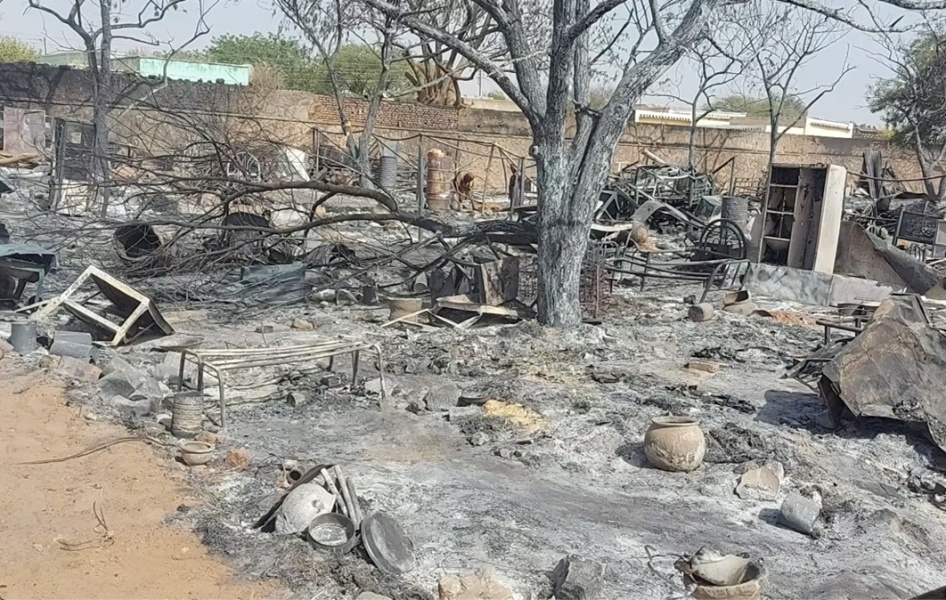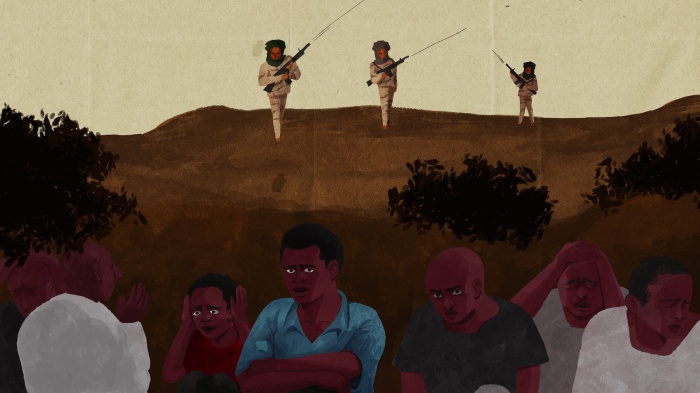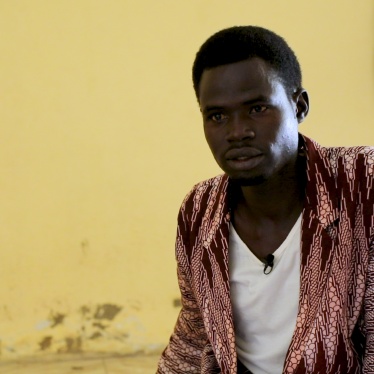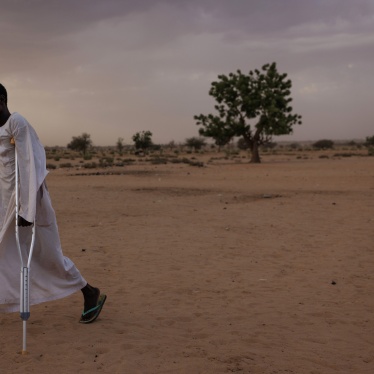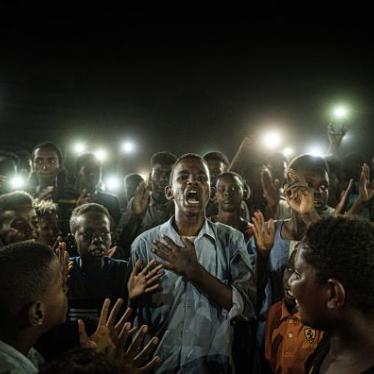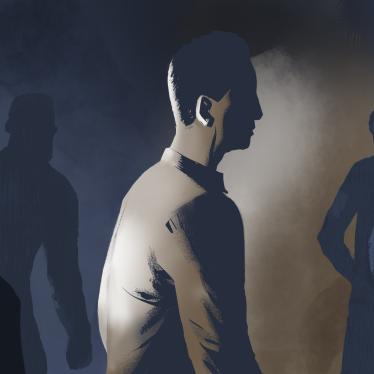- Attacks by the Rapid Support Forces and allied militias in El Geneina, capital of Sudan’s West Darfur state, killed at least thousands of people and left hundreds of thousands as refugees.
- Committing serious violations that targeted the Massalit people and other non-Arab communities with the apparent objective of at least having them permanently leave the region constitutes ethnic cleansing.
- The United Nations and African Union should urgently impose an arms embargo on Sudan, sanction those responsible for serious crimes and deploy a mission to protect civilians.
(Nairobi, May 9, 2024) – Attacks by the Rapid Support Forces (RSF) and allied militias in El Geneina, the capital city of Sudan’s West Darfur state, from April to November 2023, killed at least thousands of people and left hundreds of thousands as refugees, Human Rights Watch said in a report released today. The crimes against humanity and widespread war crimes were committed in the context of an ethnic cleansing campaign against the ethnic Massalit and other non-Arab populations in and around El Geneina.
The 218-page report, “‘The Massalit Will Not Come Home’: Ethnic Cleansing and Crimes Against Humanity in El Geneina, West Darfur, Sudan,” documents that the Rapid Support Forces, an independent military force in armed conflict with the Sudan military, and their allied mainly Arab militias, including the Third-Front Tamazuj, an armed group, targeted the predominantly Massalit neighborhoods of El Geneina in relentless waves of attacks from April to June. Abuses escalated again in early November. The attackers committed other serious abuses such as torture, rape, and looting. More than half a million refugees from West Darfur have fled to Chad since April 2023. As of late October 2023, 75 percent were from El Geneina.
“As the UN Security Council and governments wake up to the looming disaster in El Fasher, the large-scale atrocities committed in El Geneina should be seen as a reminder of the atrocities that could come in the absence of concerted action,” said Tirana Hassan, executive director at Human Rights Watch. “Governments, the African Union, and the United Nations need to act now to protect civilians.”
Targeting the Massalit people and other non-Arab communities by committing serious violations against them with the apparent objective of at least having them permanently leave the region constitutes ethnic cleansing. The particular context in which the widespread killings took place also raises the possibility that the RSF and their allies have the intent to destroy in whole or in part the Massalit in at least West Darfur, which would indicate that genocide has been and/or is being committed there.
Between June 2023 and April 2024, Human Rights Watch interviewed more than 220 people in Chad, Uganda, Kenya, and South Sudan, as well as remotely. Researchers also reviewed and analyzed over 120 photos and videos of the events, satellite imagery, and documents shared by humanitarian organizations to corroborate accounts of grave abuses.
The violence in El Geneina began nine days after fighting broke out in Khartoum, Sudan’s capital city, between the Sudanese Armed Forces (SAF), Sudan’s military, and the RSF. On the morning of April 24, the RSF clashed with a Sudanese military convoy travelling through El Geneina. Then the RSF and its allied groups attacked majority Massalit neighborhoods, clashing with predominantly Massalit armed groups defending their communities. Over the following weeks – and even after Massalit armed groups lost control of their neighborhoods – the RSF and allied militias systematically targeted unarmed civilians.
The violence culminated in a large-scale massacre on June 15, when the RSF and its allies opened fire on a kilometers-long convoy of civilians desperately trying to flee, escorted by Massalit fighters. The RSF and militias pursued, rounded up, and shot men, women, and children who ran through the streets or tried to swim across the fast-flowing Kajja river. Many drowned. Older people and injured people were not spared.
A 17-year-old boy described the killing of 12 children and 5 adults from several families: “Two RSF forces … grabb[ed] the children from their parents and, as the parents started screaming, two other RSF forces shot the parents, killing them. Then they piled up the children and shot them. They threw their bodies into the river and their belongings in after them.”
That day and in subsequent days, the attacks continued on tens of thousands of civilians who tried to cross into Chad, leaving the countryside strewn with bodies. Videos published at the time show crowds of civilians running for their lives on the road linking El Geneina to Chad.
Human Rights Watch also documented the killing of Arab residents and the looting of Arab neighborhoods by Massalit forces, and Sudanese Armed Forces’ use of explosive weapons in populated areas in ways that caused unnecessary harm to civilians and civilian objects.
The RSF and allied militias escalated their abuses again in November, targeting Massalit people who had found refuge in the El Geneina suburb of Ardamata, rounding up Massalit men and boys and, according to the UN, killing at least 1,000 people.
During the course of these abuses, women and girls were raped and subjected to other forms of sexual violence, and detainees were tortured and otherwise ill-treated. The attackers methodically destroyed critical civilian infrastructure, targeting neighborhoods and sites, including schools, in primarily Massalit displaced communities. They looted on a grand scale; and burned, shelled, and razed neighborhoods to the ground, after emptying them of residents.
These acts were committed as part of a widespread and systematic attack directed against the Massalit and other non-Arab civilian populations of Massalit-majority neighborhoods, and as such also constitute the crimes against humanity of murder, torture, persecution, and forcible transfer of the civilian population, Human Rights Watch said.
The possibility that genocide has been and/or is being committed in Darfur requires urgent action from all governments and international institutions to protect civilians. They should ensure investigation as to whether the facts demonstrate a specific intent on the part of the RSF leadership and its allies to destroy in whole or in part the Massalit and other non-Arab ethnic communities in West Darfur, that is, to commit genocide. If so, they should act to prevent its further perpetration, and to ensure those responsible for its planning and conduct are brought to justice.
The global community should support the investigations of the International Criminal Court (ICC), while states party to the court should ensure it has the financial resources needed in its regular budget to carry out its mandate in Darfur and across its docket.
Human Rights Watch identified the commander of the RSF, Mohammed “Hemedti” Hamdan Dagalo, his brother Abdel Raheem Hamdan Dagalo, and the West Darfur RSF commander Joma’a Barakallah as those with command responsibility over the forces that carried out these crimes. Human Rights Watch also named RSF allies, including a commander of the Tamazuj armed group and two Arab tribal leaders, as bearing responsibility for fighters that committed serious crimes.
The United Nations in coordination with the African Union should urgently deploy a new mission to protect civilians at risk in Sudan. The Security Council should impose targeted sanctions on those responsible for serious crimes in West Darfur, and individuals and companies that have and are violating the arms embargo. It should widen the existing arms embargo on Darfur to cover all of Sudan.
“The global inaction in the face of atrocities of this magnitude is inexcusable,” Hassan said. “Governments should ensure those responsible are held to account, including through targeted sanctions and by stepping up cooperation with the ICC.”
